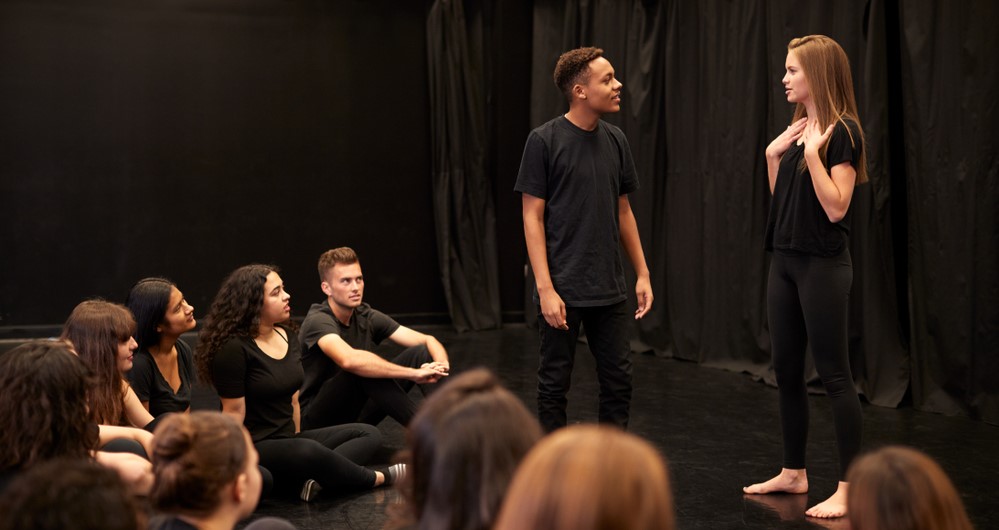In the lead-up to Roffey Park Institute’s exclusive and anticipated 2-day improvisation (improv) in organisations workshop, which will be run by the well-renowned Neil Mullarkey and Henry Larsen, we sat down and spoke to Roffey Park employee and improv enthusiast Luca Pezzano to find out more.
Luca has been partaking in improv classes for several years now and is still as keen as he was when he began. He told us how he almost stumbled across the concept when he saw an improvised-style play at the theatre and cannot recall a time when he laughed as much. “Seeing the actors express themselves with no fear or judgement was truly enlightening. It was such an energising environment – I loved it and wanted to do it!”
Luca explained that when he first joined the improvisation classes, there was no expectation for him to be a performer, comedian, or actor. Luca did not fear improv, but it put his mind at ease knowing that there was no pressure to be somebody that he was not. The only thing Luca was asked to bring to the sessions was himself; anyone can take part in improv.
Since then, Luca has been attending improv classes every other Wednesday. The format usually consists of two teams of four who separately find a generic topic to work around. Then, each team chooses one person to lead the discussion, what character that person should play, and the emotions they should feel and convey. This is where the magic happens; how do the two teams create something together? Do they go with one team’s story, the other, or both? What team’s story is stronger? Not long after, the other three team members join in with new characters with the goal to introduce new actions but not necessarily more words.
Luca explained, “By doing techniques like this you learn about people – stubbornness, vulnerability, empathy, presence, and listening, for example. Improv helps you think more productively – instead of talking too much, you act.”
Furthermore, Luca told us how improv can help with reducing fear, improving self-confidence, and discouraging the conscious and unconscious judgement of others. “I do not care what others might think of me in that moment, I just do it.” It is the creative side of improv that brings the energy amongst the participants, it is contagious and usually encourages others to create something too.

Improv in the workplace
So, how are improvisation techniques transferable to the workplace? Above all, improv is about your listening skills – the idea is that in an improv scene, there are always unexpected prompts that you must react to and overcome. This is near enough impossible to do without focused listening. In the workplace, you sometimes find yourself confronted with an ego-driven colleague, client, or boss.
The workplace is a melting pot of different and complex characters. Improv is a safe and inclusive space that encourages the collaboration and blending of traits, perspectives and life experiences. Improv is about working and learning together, not separately. The concept that improv facilitators like to use is the ‘yes, and’ concept, rather than ‘yes, but’. This open and more positive response encourages people to work together to find a solution, rather than the danger of someone dominating the scene, not listening and not being open to influence.
Senior leaders sometimes struggle to say yes, and this can hinder them as people have less motivation to work with those who shut them down, whether intentionally or unintentionally. Improv is about living in the moment – “switch off the brain and lead with your heart.”
Luca explained, “I now use improv techniques every day. I listen more and understand that I listen better too. I have learnt to use other people’s words to link and continue conversations and not fear that I might say something wrong as it could be a hook for someone else. I have more self-respect and higher self-esteem. I have learnt how to improve collaboration and learnt how to say yes rather than no, it is a mindset change. Once I finish a session on Wednesday evening, I feel amazing on Thursdays and much better about myself, especially at work.”

Roffey Park’s improvisation in organisations workshop
We also spoke to Neil Mullarkey and Henry Larsen, who will be running the 2-day improvisation in organisations workshop on the 28 – 29th of September 2023 at Roffey Park Institute. Neil and Henry are both at the leading edge of improvisation and how it can help us lead through complexity and change in the workplace; they are both masters of their craft.
As an actor, writer and comedian, Neil comes equipped with the practical skills associated with improv which will be enhanced by Henry’s, an associate Professor at the University of Southern Denmark, deep understanding of the theories beneath the tools. Over two days participants will have the opportunity to discuss different perspectives on improv practices in organisations and learn by experiencing and practising techniques.
We asked them both, what can participants expect from the two workshops? Participants will get to arm themselves with the tools that will allow them to prepare for even the most uncertain moments. They will get to know people they have never met before in a way that they would not normally does through most management training. Participants will leave with a clearer idea about what interaction means and how the quality of interaction is forming and transforming us every day.
Organisations are not machines, so machine-based metaphors and lessons are not particularly helpful. Improv is useful in teaching us how to emotionally deal with an uncertain world where everybody is different.
Join Neil and Henry in September and equip yourself with the ability to co-create something new, navigate through unpredictable change and become a nimble leader that is open to possibilities.





